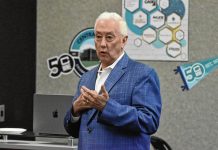On Jan. 21, the Women’s March on Washington took place in our nation’s capital. Hundreds of thousands of people attended the march, and large numbers of people also pulled through to host “sister marches” in other cities and nations worldwide.
The march primarily aimed to draw attention to the rights, health and safety of women but also that of people within the LGBT+ community, people of color and other minorities because many feel that the election of our new president has brought forth a threat to those rights.
The Women’s March on Washington was the largest inaugural protest in U.S. history, all the while remaining peaceful. Police reported that they did not make a single arrest while people marched throughout the streets with their signs showing messages of equality and rights for everyone.
Freedom Smith, a senior at Jennings County High School, attended the march in Washington with some of her family members from Tennessee, who had already planned on attending the event. As a self-described “hardcore feminist,” Smith said had already been following the plans for the march beforehand.
“I think that the most important thing to me was marching to show that, even with so many things changing right now, women all over the world will continue to fight for what they think is right,” Smith said.
She said her favorite moment from the day was when actress Ashley Judd read a poem titled “Nasty Woman.” Smith said that it was incredibly iconic and powerful.
When asked about how it felt to be in attendance at an historic event, Smith said, “It was something I can’t explain in words — it just felt so powerful and positive. You knew everyone around you was fighting for the same thing you were and it’s a beautiful feeling.”
Women were not the only ones who attended the marches; there were also many men in attendance who were supporting the cause and the women in their lives. There were also numerous celebrities who attended either the Women’s March on Washington or one of the sister marches around the country, including Nick Offerman, Ariana Grande, Tyler Oakley, Katy Perry and Emma Watson — all of whom are well-known advocates of equality.
The Women’s March and all of the “sister marches” served as a reminder that advocates of equality and rights for all will not stop supporting their cause until there is no longer a reason to take to the streets in protest of unfair laws and policies that prevent people from holding onto the rights they deserve as human beings.




